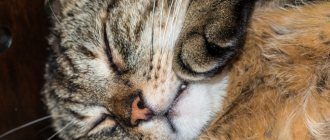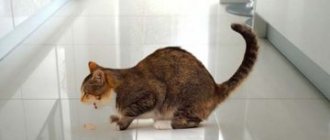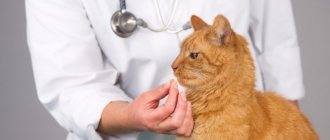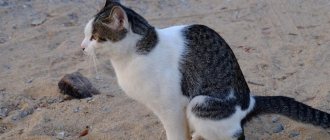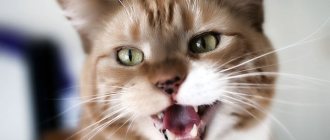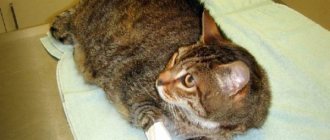Adult cats and cats are real predators. Animals that have free range are happy to catch birds and mice. And especially seasoned cats do an excellent job even with rats. For humans, the extermination of rodents near residential buildings is very good, but for cats there may be danger lurking here. Cats can become poisoned by drugs used to kill rodents. If a cat eats a poisoned mouse, it begins to become intoxicated, which can be fatal.
How can a cat get poisoned?
Almost all poisons used to kill rodents are zoocoumarins.
These drugs reduce blood clotting and provoke various types of bleeding. Typically, the poison must be taken regularly for it to be effective. If a cat eats a poisoned mouse or rat once, then nothing threatens its health, but if eating rodents occurs repeatedly, then poisoning is possible. In addition, your pet can become poisoned if it periodically eats rat and mouse bait. There is a group of drugs that also belong to the latest generation of coumarins. These poisons are more toxic:
- Zinc phosphide.
- Bromethalin.
- Sodium fluoroacetate.
Such drugs are very poisonous for animals; poisoning can result from consumption of bait or a rodent infected with poison. Food baits that are used to fight mice will be of little interest to a cat, since they are made on the basis of a grain mixture. But bait for rats is often made based on meat or fish products.
Unhealthy food
Cat owners, especially people living in private properties and houses, rejoice when their pets start hunting for mice - pests of the household, and do not find anything wrong with the fact that the hunter decided to feast on his trophy. On the one hand, eating mice is natural for cats, on the other hand, such a lunch or dinner can turn into a huge problem for the animal, and often for the owner himself.
Signs of a cat being poisoned by rat poison
If the cat is affected by rat poison or other poisons from the group of zoocoumarins, then the symptoms will be as follows:
- various bleedings - nasal, stomach, uterine. Hemorrhages appear in the oral cavity. These symptoms can develop within ten days after the toxic drug enters the body;
- vomiting – this symptom does not necessarily appear. Happens immediately after eating a poisoned rodent;
- internal bleeding - with such damage, the cat can die within a few days, without any obvious signs of poisoning.
You can recognize that poisons of this type are used in the area by looking at already dead rodents. They may notice blood coming from the rectum or mouth.
If a cat eats a mouse poisoned with rat poisons of other groups, the symptoms will be as follows:
- increased excitability, nervousness, atypical dynamism;
- complete loss of coordination - the animal’s gait is unstable, its paws get tangled, and the cat falls over on its side. There may be involuntary head shaking;
- neurological manifestations - convulsions, twitching of muscles and paws;
- body temperature rises significantly;
- the animal becomes lethargic and drowsy.
When the first signs of poisoning appear, your pet must be taken to a veterinary clinic!
Diagnostics
When the first signs appear indicating possible poisoning by rat poison, it is necessary to show the cat to a veterinarian as soon as possible.
The diagnosis of intoxication with zoocoumarins is made by a doctor based on the totality of symptoms, a positive blood test for the presence of anticoagulants in it, a urine test and how the animal’s body reacts to the treatment started.
Important!
The owner's story can clarify a lot if it is difficult to make a diagnosis. Therefore, it is extremely important, during an examination by a veterinarian, to tell him about all, even the most insignificant details of the course of the disease.
First aid for a cat in case of poisoning
What should you do first if your cat has eaten a rodent and is worried? The sequence of actions is given below:
- Induce vomiting - this procedure makes sense only if the cat has eaten suspicious food in full view of the owners. Otherwise, the poison has long been absorbed into the bloodstream, and vomiting will cause the condition to worsen due to dehydration. To provoke vomiting in a cat, you need to give a 3% solution of hydrogen peroxide and water in equal parts. A teaspoon of this solution is per 2 kg of cat weight. You can use a concentrated solution of table salt or sprinkle a pinch of soda on your cat's tongue. The prepared solutions are infused into the cat by force, using a syringe without a needle or syringe.
- To neutralize toxins in the stomach, the cat is given any sorbent that is available in the home medicine cabinet. The drug is dissolved in half a glass of warm water and poured into the pet’s mouth.
- Next, the cat is fed any enveloping foods that will reduce the absorption of poison into the mucous membranes. It can be raw eggs, milk jelly, or a decoction of flaxseeds.
Sorbents and products that envelop the mucous membrane are given to the animal only after vomiting has completely stopped.
- Three hours after the last dose of the coating agent, the cat is given a laxative. A 2% solution of magnesium or sodium sulfate, castor oil or petroleum jelly are suitable for this.
- Rinse the intestines with an enema. About 30 ml of saline solution or clean water is injected into the cat's rectum.
The enema liquid should be taken slightly warm. Hotter water promotes stronger absorption of toxins into the blood.
If the cat's symptoms indicate the action of anticoagulants, drugs that interfere with blood clotting, then vitamin K is injected into the muscle in a dosage of 1-2 ml. A pet's recovery is usually long and can range from three weeks to three months.
A fairly common poison for exterminating rodents is zinc phosphide. It threatens the life of a cat only when bait containing rodent poison has been eaten. When a cat eats a mouse or rat that is poisoned with this poison, there is no danger to health. When directly eating the bait, the cat’s first signs appear within a short time and look like this:
- uncontrollable vomiting, sometimes streaked with blood;
- severe pain in the gastrointestinal tract;
- a characteristic smell of rotten fish appears from the oral cavity;
- respiratory function becomes difficult;
- convulsions appear.
If the cat is not quickly provided with emergency assistance, then death occurs within a short period of time.
If an animal is intoxicated with zinc phosphide, first aid consists of washing the stomach with a 0.5% solution of copper sulfate and a 2% solution of baking soda. Medicines containing aluminum and magnesium, such as Maalox, can be given.
Inducing vomiting
Cat vomit syrup will help induce vomiting.
Inducing vomiting is one of the effective treatments. Emetic root syrup in an amount of 3-4 ml will help with this.
Alternatively, if there is no vomiting root, you can regularly give your cat warm boiled water and then make the characteristic vomiting motion by pressing firmly but gently on the root of the cat's tongue.
The rehabilitation period for a cat after poisoning
For any degree of poisoning, the cat needs to be examined by a veterinarian and prescribed adequate treatment. Even with the pet’s apparent health, the consequences can continue to manifest themselves for a long time. In addition to medications, the cat needs proper care and diet.
Within 24 hours after the first symptoms of poisoning appear, the cat is given only water and sorbents. From the second day you can start feeding the animal in small portions several times a day. The following products are used in cat food:
- boiled meat - horse meat, veal, lean beef, chicken breast;
- fish of different varieties, but not too fatty;
- boiled liver;
- vegetables - boiled carrots, beets, cauliflower;
- viscous porridges - oatmeal, buckwheat, rice.
A few days after poisoning, you can start giving small amounts of raw foods - meat, liver, fish, eggs. Liver is given raw only when you are confident in the high quality of the product and there are no signs of liver infection by parasites. Otherwise, it is better to boil it a little. Meat and fish are ground into minced meat for better digestion by a weakened stomach. You can make something like a fish and meat pate, which will be rich in minerals and vitamins. It is better to boil the egg white, it is difficult for the stomach to process, but the yolk can be added to the porridge raw.
Dairy products are gradually being reintroduced into the cat's diet. This can be low-fat milk, cottage cheese and low-fat cheese. You can give bifidokefir, which stimulates the intestinal mucosa well and helps avoid constipation.
All food for a cat during the rehabilitation period should be light, fresh and easily digestible.
Animal prevention measures
During the recovery period, the cat is given more attention, its nutrition and reaction to medications and foods are monitored. However, poisoning is easier to prevent than to treat. Preventive measures are quite simple.
Measures:
- When baiting rodents, do not allow the cat to visit these places.
- Make sure that the animal does not pick up anything from the ground.
- In villages and villages where there are a lot of mice, do not allow the cat to walk in places where they accumulate.
It is often difficult to keep track of the movements of a furry pet, so you need to pay attention to its behavior, always have a supply of activated carbon in the house and know the veterinarian’s number.
You will like the article: “ What to feed a cat (kitten) after poisoning .”
Any animal owner should know the symptoms and treatment for cat poisoning with rat poison. It is recommended to remember that such a substance is dangerous and can be fatal. Timely assistance and selected treatment will help save the cat’s life, and compliance with preventive measures will help avoid poisoning.
What not to give to a cat after poisoning
After poisoning, the cat is strictly prohibited from giving the following products:
- dry food of any class. Regardless of whether it is a budget food or a premium one, it causes severe irritation to the stomach, which has not had time to recover after the poison entered the body;
- canned cat food - this food is not healthy, it does not contain the necessary enzymes that improve digestion. Canned food should only be offered to a cat in exceptional cases;
- offal – it is worth removing tripe, udder and kidneys from the cat’s diet for a while. Boiled beef heart can be given in limited quantities;
- legumes in any form cause bloating;
- confectionery products – a high carbohydrate content is not desirable for an organism that has just experienced severe intoxication;
- bread and pasta are difficult to digest due to the weakened gastric mucosa. May cause stagnation in the digestive system.
Your cat may have poor appetite for a long time after poisoning. Under no circumstances should you force feed her. Sometimes you have to keep the animal on IVs for several days.
When to go to the hospital
If a cat is poisoned by rat poison, then contacting a medical facility is mandatory. The veterinarian will examine the animal and carry out the necessary diagnostics. After receiving the examination results, suitable treatment is selected. However, first of all, an antidote must be administered. For rat poison, this is vitamin K1, sometimes it is replaced with the drug Vikasol.
In the first stages of poisoning, the antidote is administered in large volumes by injection. After the cat’s condition has stabilized, the medicine can be given in tablets. Additional medications are required to normalize the animal’s condition.
Ten days later, an additional examination is carried out to determine the level of platelets in the blood. If the indicator is close to normal, treatment can be completed. If treatment of poisoning is started on time, the prognosis is favorable.
After poisoning, you need to carefully monitor the animal's diet. The diet includes dietary products with low fat content; it is recommended to avoid industrial feed for a while. You can’t force feed your cat, as the appetite will gradually be restored.
We recommend: What to feed a cat (kitten) after poisoning
Consequences of cat poisoning by mouse
Any poison causes severe intoxication of the body and disables all important organs and systems. A particularly toxic substance for animals is rat poison, which is used to control rodents. There may be no consequences of poisoning, but they may be very severe:
- Acute liver damage, which leads to organ enlargement and chronic jaundice.
- Neurological diseases - paralysis of limbs, loss of coordination.
- Changes in the organs of vision - with severe poisoning, a cat may develop optic nerve atrophy and blindness.
- Hearing impairment.
- Disorders of the urinary system - urinary incontinence and chronic inflammation of the bladder.
- Persistent allergic reactions, which are accompanied by hair loss and itching.
- Reproductive dysfunction.
- Comatose state and death.
Features of the treatment of acute and chronic intoxication
It is important to correctly determine the type of intoxication, assess the severity of poisoning, identify concomitant diseases and general health. Most chronic intoxications can be treated at home by changing your diet and giving up bad habits. Workers in hazardous industries should think about changing their place of work. The first stage is cleansing the body. The second stage is the restoration of the normal functioning of the gastrointestinal tract, which can be considered as a single factory responsible for our health. Hepatoprotectors are prescribed as drug therapy to enhance the detoxification function of the liver and protect it from negative effects; alginates for binding and removing chemical elements and toxic compounds, liquid chlorophyll, sorbents and other detoxification agents.
How to protect your cat from poisoning
Cats are animals that walk on their own. Unlike dogs, it is difficult for them to put on a collar and dictate the path of a walk. These animals love freedom and independence. To avoid severe poisoning in cats, you need to follow a few rules. A cat should always be fed before walking; with a full stomach, it will not look for food on the street. You should not scatter poisoned bait for rodents in the house and surrounding area; it is better to use the services of a sanitation station.
Love your pets and be extremely attentive to them. If your cat shows signs of illness, do not turn a blind eye. It depends on the actions of the owner how quickly the cat recovers from poisoning and whether it will have any consequences. The person’s task is to deliver the cat to the hospital as quickly as possible.
